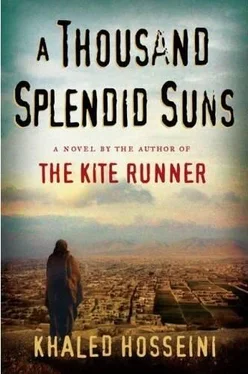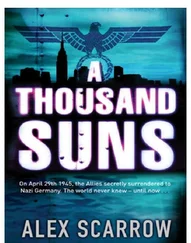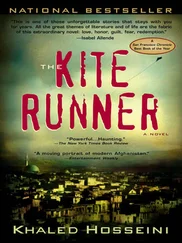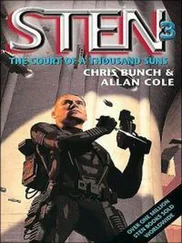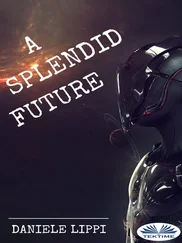"Do you have witnesses? Other than your ambagh?"
"I do not," said Mariam.
"Well, then." He threw up his hands and snickered.
It was the sickly Talib who spoke next.
"I have a doctor in Peshawar," he said. "A fine, young Pakistani fellow. I saw him a month ago, and then again last week. I said, tell me the truth, friend, and he said to me, three months, Mullah sahib, maybe six at most – all God's will, of course."
He nodded discreetly at the square-shouldered man on his left and took another sip of the tea he was offered. He wiped his mouth with the back of his tremulous hand. "It does not frighten me to leave this life that my only son left five years ago, this life that insists we bear sorrow upon sorrow long after we can bear no more. No, I believe I shall gladly take my leave when the time comes.
"What frightens me, hamshira, is the day God summons me before Him and asks, Why did you not do as I said, Mullah? Why did you not obey my laws? How shall I explain myself to Him, hamshira? What will be my defense for not heeding His commands? All I can do, all any of us can do, in the time we are granted, is to go on abiding by the laws He has set for us. The clearer I see my end, hamshira, the nearer I am to my day of reckoning, the more determined I grow to carry out His word. However painful it may prove."
He shifted on his cushion and winced.
"I believe you when you say that your husband was a man of disagreeable temperament," he resumed, fixing Mariam with his bespectacled eyes, his gaze both stern and compassionate. "But I cannot help but be disturbed by the brutality of your action, hamshira. I am troubled by what you have done; I am troubled that his little boy was crying for him upstairs when you did it.
"I am tired and dying, and I want to be merciful. I want to forgive you. But when God summons me and says, But it wasn't for you to forgive, Mullah, what shall I say?"
His companions nodded and looked at him with admiration.
"Something tells me you are not a wicked woman, hamshira. But you have done a wicked thing. And you must pay for this thing you have done. Shari'a is not vague on this matter. It says I must send you where I will soon join you myself.
"Do you understand, hamshira?"
Mariam looked down at her hands. She said she did.
"May Allah forgive you."
Before they led her out, Mariam was given a document, told to sign beneath her statement and the mullah's sentence. As the three Taliban watched, Mariam wrote it out, her name – the meem, the reh, the yah, and the meem – remembering the last time she'd signed her name to a document, twenty-seven years before, at Jalil's table, beneath the watchful gaze of another mullah.
MARIAM SPENT TEN DAYS in prison. She sat by the window of the cell, watched the prison life in the courtyard. When the summer winds blew, she watched bits of scrap paper ride the currents in a frenzied, corkscrew motion, as they were hurled this way and that, high above the prison walls. She watched the winds stir mutiny in the dust, whipping it into violent spirals that ripped through the courtyard. Everyone – the guards, the inmates, the children, Mariam – burrowed their faces in the hook of their elbows, but the dust would not be denied. It made homes of ear canals and nostrils, of eyelashes and skin folds, of the space between molars. Only at dusk did the winds die down. And then if a night breeze blew, it did so timidly, as if to atone for the excesses of its daytime sibling.
On Mariam's last day at Walayat, Naghma gave her a tangerine. She put it in Mariam's palm and closed her fingers around it. Then she burst into tears.
"You're the best friend I ever had," she said.
Mariam spent the rest of the day by the barred window watching the inmates below. Someone was cooking a meal, and a stream of cumin-scented smoke and warm air wafted through the window. Mariam could see the children playing a blindfolded game. Two little girls were singing a rhyme, and Mariam remembered it from her childhood, remembered Jalil singing it to her as they'd sat on a rock, fishing in the stream:
Lili lili birdbath,
Sitting on a dirt path,
Minnow sat on the rim and drank,
Slipped, and in the water she sank.
Mariam had disjointed dreams that last night. She dreamed of pebbles, eleven of them, arranged vertically. Jalil, young again, all winning smiles and dimpled chins and sweat patches, coat flung over his shoulder, come at last to take his daughter away for a ride in his shiny black Buick Roadmaster. Mullah Faizullah twirling his rosary beads, walking with her along the stream, their twin shadows gliding on the water and on the grassy banks sprinkled with a blue-lavender wild iris that, in this dream, smelled like cloves. She dreamed of Nana in the doorway of the kolba, her voice dim and distant, calling her to dinner, as Mariam played in cool, tangled grass where ants crawled and beetles scurried and grasshoppers skipped amid all the different shades of green. The squeak of a wheelbarrow laboring up a dusty path. Cowbells clanging. Sheep baaing on a hill.
ON THE WAY to Ghazi Stadium, Mariam bounced in the bed of the truck as it skidded around potholes and its wheels spat pebbles. The bouncing hurt her tailbone. A young, armed Talib sat across from her looking at her.
Mariam wondered if he would be the one, this amiable-looking young man with the deep-set bright eyes and slightly pointed face, with the black-nailed index finger drumming the side of the truck.
"Are you hungry, mother?" he said.
Mariam shook her head.
"I have a biscuit. It's good. You can have it if you're hungry. I don't mind."
"No. Tashakor, brother."
He nodded, looked at her benignly. "Are you afraid, mother?"
A lump closed off her throat. In a quivering voice, Mariam told him the truth.
"Yes. I'm very afraid."
"I have a picture of my father," he said. "I don't remember him. He was a bicycle repairman once, I know that much. But I don't remember how he moved, you know, how he laughed or the sound of his voice." He looked away, then back at Mariam. "My mother used to say that he was the bravest man she knew. Like a lion, she'd say.
But she told me he was crying like a child the morning the communists took him. I'm telling you so you know that it's normal to be scared. It's nothing to be ashamed of, mother."
For the first time that day, Mariam cried a little.
THOUSANDS OF EYES bore down on her. In the crowded bleachers, necks were craned for the benefit of a better view. Tongues clucked. A murmuring sound rippled through the stadium when Mariam was helped down from the truck. Mariam imagined heads shaking when the loudspeaker announced her crime. But she did not look up to see whether they were shaking with disapproval or charity, with reproach or pity. Mariam blinded herself to them all.
Earlier that morning, she had been afraid that she would make a fool of herself, that she would turn into a pleading, weeping spectacle. She had feared that she might scream or vomit or even wet herself, that, in her last moments, she would be betrayed by animal instinct or bodily disgrace. But when she was made to descend from the truck, Mariam's legs did not buckle. Her arms did not flail. She did not have to be dragged. And when she did feel herself faltering, she thought of Zalmai, from whom she had taken the love of his life, whose days now would be shaped by the sorrow of his father's disappearance. And then Mariam's stride steadied and she could walk without protest.
An armed man approached her and told her to walk toward the southern goalpost. Mariam could sense the crowd tightening up with anticipation. She did not look up. She kept her eyes to the ground, on her shadow, on her executioner's shadow trailing hers.
Читать дальше
